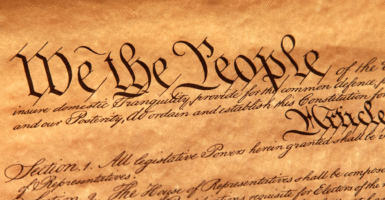Public policy is often exciting and urgent. When a war begins or ends, when votes are counted in an election, or when a major bill is passed, everyone senses the magnitude of the event.
Some struggles end and new struggles begin. Consequences carry far into the future. Compared to this, and especially given the way we think today, the Constitution seems like a boring subject.
But how do we know whether the public policies we adopt are good? How do we know whether the results of the election will be happy? How even do we know if the war we have fought was worth it?
Those questions cannot be answered except by reference to things that are outside the immediate excitement and even our immediate needs.
These larger and more enduring things cannot be understood without understanding what we are, how we should live, how best over the long term we can achieve a good life and be free. Somehow, urgent things have to be judged in light of ultimate things.
The profoundest example of this is in our famous Declaration of Independence. The people of America decided to form their own country. It was an act of rebellion. It would carry a death sentence for many if the revolution failed, and it did carry that sentence for many in the subsequent war.
How remarkable that in this urgent moment, they would base what they did upon the “laws of nature and of nature’s God.” They were looking upward toward the eternal as they began their battle. That is one of the essential reasons why they succeeded.
How can we remember to do this kind of thinking, when so many urgent things press upon us and when hundreds of millions of us participate?
The answer is given best of all in history by the Constitution of the United States, the partner of the declaration, prefigured in its middle passages.
The purpose of the Constitution is to ground the government in the people’s authority. It is also to make both we and our government thoughtful. “It is our reason alone,” writes James Madison, “that must be placed in control of the government. Our passions must be controlled by it.”
Under the Constitution, it takes time to do big things: We must think before we act. The Constitution divides power across the land and between levels and branches of government; the people and the parts of the government must cooperate if anything is to be done.
To get a majority, they must give reasons—out loud and in front of millions. This encourages candor and discourages the rankest forms of partisanship.
Yes, it is still partisan, but at our best moments we are better than anywhere else. Moreover, the Constitution limits what we can do to each other, teaching us self-restraint and independence.
In recent decades, our country has suffered public policy disasters. We have fought many wars without decisive victory. We have spent many trillions without removing the problems they were designed to remove. We have become a great debtor nation with fewer reserves, even if our reserves are still great.
These facts are connected to the compromising of our constitutional practices. We have changed the way we make laws. The government is less accountable, and the laws are more numerous and impossible to understand.
We have made government more centralized, and so its proper central functions—especially defense—are starved for resources.
As the government gets bigger, the people get smaller. They are regulated in their private lives, obstructed when they strive, subsidized in many cases into failure. This is just what the Constitution was designed to prevent.
No institution has done more to describe and promote public policy from the conservative point of view than The Heritage Foundation. It was born decades ago for specifically this purpose. It has always had an interest in the Constitution.
Now, it is bringing together all of its efforts relating to that great document into the Institute for Constitutional Government, launching Nov. 29, to achieve better focus. As a friend of the Constitution and of Heritage, I am proud of this.
It can only be good. Our freedom is at stake. We will not save it without restoring our Constitution.




























